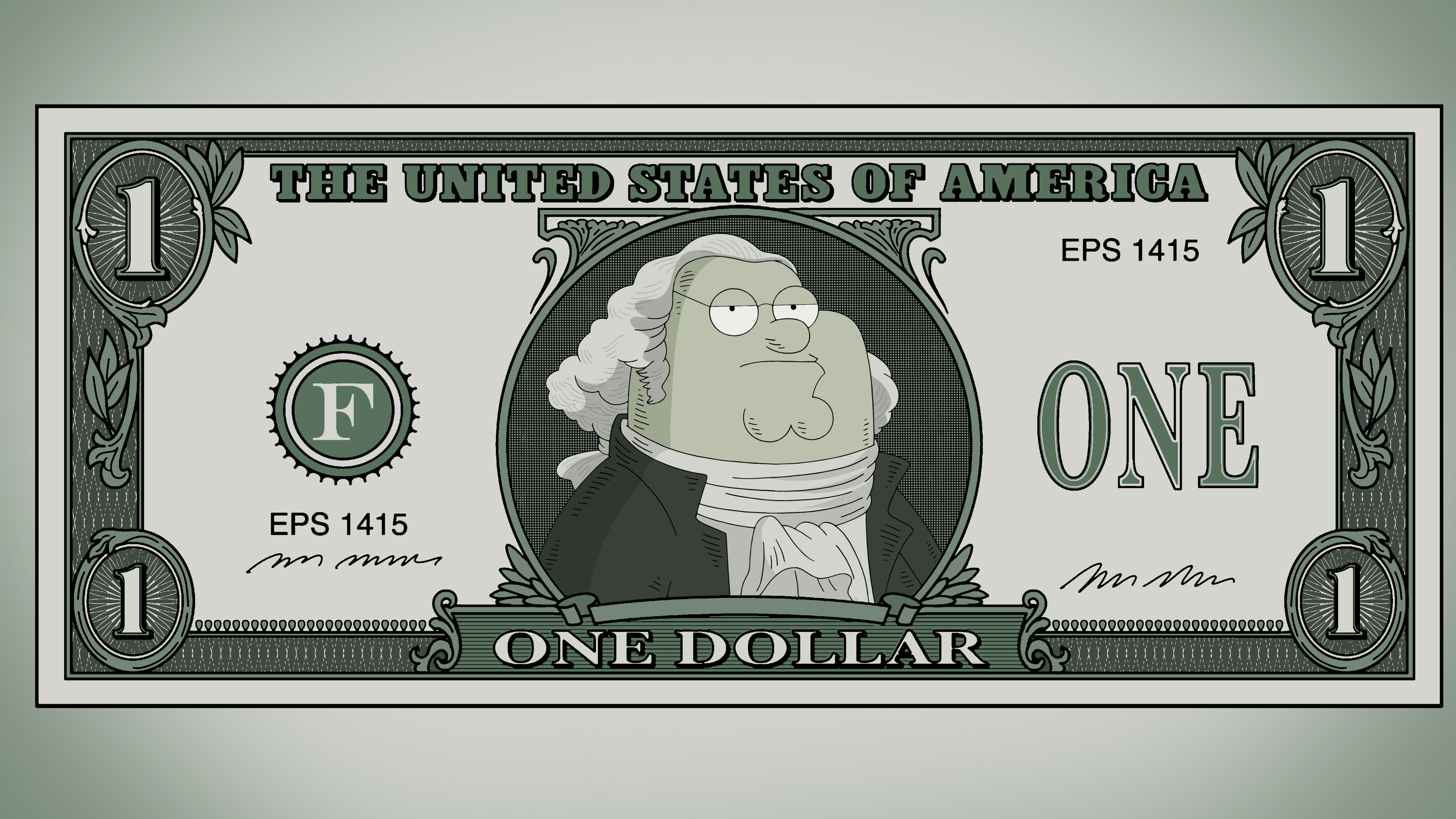Have you ever stopped to think about the sheer financial muscle behind your favorite animated shows? It's a question many fans ponder, especially when it comes to long-running hits. We often enjoy the humor and the stories, but the business side of things, like how much money has Family Guy made, is a pretty fascinating topic, you know? This show, with its unique brand of humor and memorable characters, has been a television staple for what feels like ages, and its financial success is, well, rather substantial.
When people ask "how much money has Family Guy made," they're usually curious about the overall financial picture. It's not just about what it earns from new episodes. We're talking about a truly vast sum, a great quantity of money generated from all sorts of places, you see. It's a far larger amount than just the initial production costs, which is pretty typical for a show that's been around for so long.
Understanding the full scope of Family Guy's earnings means looking at many different avenues. It’s a bit like piecing together a very big financial puzzle, so. From its early days on television to its global reach today, the money has kept flowing in, making it a very, very successful venture in the entertainment world.
Table of Contents
- The Beginnings and Early Money
- The Power of Syndication and Reruns
- Merchandise and Licensing: A Big Piece of the Pie
- Streaming Deals and Digital Earnings
- Who Gets What: The Creators and Actors
- The Overall Financial Picture
- Why Family Guy Keeps Earning and Earning
- Frequently Asked Questions
The Beginnings and Early Money
Family Guy first hit our screens in 1999, created by Seth MacFarlane. It had a bit of a rocky start, actually, getting canceled not once, but twice, which is pretty wild for a show that's now so famous. But, fans really loved it, and strong DVD sales showed there was a real demand for more, you know? This early fan support, in a way, laid the groundwork for its future financial success.
The initial seasons brought in some money from advertising and network fees. However, the real financial potential of the show wasn't fully apparent during those early runs. It was more about building an audience and finding its voice, so to speak, rather than making a huge profit right away. The early investment, though seemingly risky at the time, really paid off later.
The Power of Syndication and Reruns
One of the biggest money-makers for any long-running TV show is syndication. This means selling the rights for networks and local stations to air reruns, and it's where Family Guy has made a very, very large portion of its money. Once a show has enough episodes, it becomes incredibly valuable for syndication because stations can air it repeatedly, often several times a day, which is quite something.
Family Guy entered syndication in 2007, and it was a huge deal. Turner Broadcasting, for example, reportedly paid a substantial amount for the cable syndication rights, allowing channels like Adult Swim to show reruns almost constantly. This kind of deal means a steady, reliable stream of income for years and years, nearly guaranteeing a continuous flow of cash.
The beauty of syndication is that it’s passive income, you could say. The episodes are already made, and they just keep getting aired, bringing in advertising revenue for the stations and fees back to the show's owners. It truly shows what a large quantity of money can be generated from past work, you know.
Merchandise and Licensing: A Big Piece of the Pie
Beyond airing episodes, Family Guy has earned a very significant amount from merchandise and licensing deals. Think about all the Stewie plush toys, Peter Griffin t-shirts, and even video games based on the show. These items generate money every time they are sold, which is a lot of sales, actually.
The characters and catchphrases are instantly recognizable, making them perfect for consumer products. From clothing to collectible figures, keychains, and even board games, the range of merchandise is pretty wide. Each licensed product adds to the overall earnings, making this a rather important part of the show's financial success.
Licensing also extends to things like mobile games and other digital products. These deals allow other companies to use the Family Guy brand, characters, and humor, and in return, they pay a fee or a percentage of their sales. This means the show's influence, and its earnings, spread far beyond just television screens, you know.
Streaming Deals and Digital Earnings
In recent years, streaming platforms have become a huge part of how people watch TV, and Family Guy has certainly capitalized on this. Deals with services like Netflix and Hulu have brought in a lot of money, too, providing another major income stream. These platforms pay for the rights to host the show, giving them content to attract subscribers.
Having the show available on streaming services also introduces it to new audiences, which can then boost interest in merchandise or even older episodes. It’s a bit of a cycle, really, where accessibility leads to more popularity and, eventually, more money. This digital presence is pretty crucial in today's media environment, apparently.
Digital sales of individual episodes or full seasons on platforms like Amazon Prime Video or iTunes also add to the overall revenue. While perhaps not as large as major syndication or streaming deals, these direct-to-consumer sales contribute a good amount, showing that people are willing to pay to own their favorite episodes, in a way.
Who Gets What: The Creators and Actors
Seth MacFarlane: The Mastermind
Seth MacFarlane, as the creator, executive producer, and voice of several main characters (Peter, Stewie, Brian, and Quagmire), has obviously earned a very, very substantial amount from Family Guy. His contracts over the years have been incredibly lucrative, reflecting his central role in the show's creation and ongoing success. He gets a cut from pretty much every income stream, which is fair, considering he made it all happen.
Reports suggest MacFarlane earns tens of millions of dollars annually from his various projects, with Family Guy being a significant contributor. His overall net worth, largely due to the success of this show and others like American Dad!, is truly a large amount, reflecting the immense impact he's had on animated television. He's arguably one of the highest-paid people in animation, too, which is quite something.
The Voice Cast Earnings
The talented voice cast, including Alex Borstein (Lois, Tricia Takanawa), Seth Green (Chris), and Mila Kunis (Meg), also earns a very good living from the show. While their earnings are not as high as MacFarlane's, they still make a significant amount per episode, especially as the show has gained popularity and longevity. Their voices are, in some respects, the heart of the characters.
For long-running animated shows, voice actors can negotiate impressive salaries, especially when a show reaches a certain number of episodes and enters profitable syndication. They typically earn a per-episode fee, and sometimes a share in syndication profits, which adds up to a rather nice income over the years. It's a pretty sweet deal for them, you know.
The Overall Financial Picture
So, how much money has Family Guy made in total? Pinpointing an exact, publicly verified figure is difficult because media companies rarely disclose precise revenue breakdowns for individual shows. However, industry estimates and reports over the years paint a picture of truly massive earnings, a very, very large amount of money.
Between network licensing fees, domestic and international syndication deals, DVD and digital sales, merchandise, and streaming agreements, Family Guy is widely believed to have generated billions of dollars in revenue since its debut. Some reports have put its total earnings well over $2 billion, which is, honestly, a staggering sum. It’s a huge commercial success, more or less.
This includes money made for Fox, the production companies involved, and the creators and cast. When we use the word "much" to describe these earnings, it really means "great in quantity, amount, extent, or degree," reflecting a substantial financial impact. It’s a far larger amount of something than just a simple profit margin, you see.
Why Family Guy Keeps Earning and Earning
Family Guy's continued financial success comes down to a few key factors. First, its unique and often controversial humor keeps people talking and watching. It has a dedicated fan base that spans generations, which is pretty amazing. This consistent viewership keeps the show valuable for advertisers and platforms, too.
Second, its adaptability across different media platforms has been crucial. From traditional television to DVDs, then streaming, and even mobile games, the show has consistently found new ways to reach audiences and generate income. This ability to evolve with changing consumption habits is a big reason for its longevity and sustained earnings, you know.
Finally, the sheer volume of episodes means it's always in demand for reruns and streaming libraries. A show with over 400 episodes provides a huge amount of content for networks and services to fill their schedules, which translates directly into more money over time. It’s a pretty solid business model, actually. Learn more about on our site.
Frequently Asked Questions
How much money does Seth MacFarlane make from Family Guy?
Seth MacFarlane earns a very significant amount from Family Guy, acting as its creator, executive producer, and main voice actor. His earnings are reportedly in the tens of millions of dollars annually from the show and related ventures, making him one of the highest-paid figures in animation, you know.
Is Family Guy still profitable for Fox?
Yes, Family Guy remains very profitable for Fox. Its long-running status, consistent viewership, and extensive syndication deals across various platforms ensure a steady and substantial revenue stream. It's a valuable asset in their programming lineup, providing a large amount of consistent income, apparently.
What are the main ways Family Guy makes money?
Family Guy makes money through several key avenues. These include network licensing fees for new episodes, highly lucrative syndication deals for reruns on other channels, revenue from streaming service agreements, sales of DVDs and digital episodes, and a very significant amount from merchandise and licensing consumer products, too. You can also find more information on this page .



Detail Author:
- Name : May Dicki
- Username : clinton20
- Email : lemke.juvenal@hotmail.com
- Birthdate : 1971-10-21
- Address : 37201 Liliane Shores Lake Sydneechester, GA 12218
- Phone : 1-380-575-5010
- Company : Runte-Dibbert
- Job : Benefits Specialist
- Bio : Enim labore vel laudantium fugit debitis esse mollitia. Maiores qui doloribus est. Dolorem repellendus iusto eveniet qui quia. Doloribus necessitatibus iusto id quibusdam expedita officia.
Socials
twitter:
- url : https://twitter.com/denesikl
- username : denesikl
- bio : Optio adipisci est totam provident. Qui est error tenetur dolorem sed tempore. Deleniti consequatur aperiam rem.
- followers : 1386
- following : 44
instagram:
- url : https://instagram.com/laynedenesik
- username : laynedenesik
- bio : Qui quo impedit ut tempora ipsum. Soluta ipsam doloribus omnis sit at.
- followers : 5766
- following : 2099
tiktok:
- url : https://tiktok.com/@ldenesik
- username : ldenesik
- bio : Voluptatum nulla ab quia eaque dolores sit nam.
- followers : 6887
- following : 1052
facebook:
- url : https://facebook.com/ldenesik
- username : ldenesik
- bio : Magni est quisquam distinctio. Sequi delectus et molestiae eligendi.
- followers : 3494
- following : 1388
linkedin:
- url : https://linkedin.com/in/layne_denesik
- username : layne_denesik
- bio : Nulla ad corrupti ex omnis sequi hic.
- followers : 342
- following : 1471